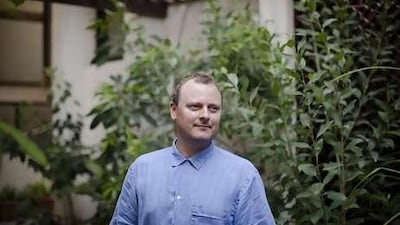My attitude to money would have been appreciated by my namesake, the British economist John Maynard Keynes, in that I am very good at spending money but not terribly good at saving it. I was bitten by the travel bug very early in life and still believe that life is too short to constantly strive to save. There are so many places to see and cultures to experience.
I'm married with four-year-old twin sons, and moved to Abu Dhabi two years ago for my job as a deputy teaching centre manager at the British Council in Abu Dhabi, an organisation for cultural relations and educational opportunities. We're leaving shortly to take up a post in Burma. I'm ambitious and want to be a success, but not in the sense that I want a yacht, a five-storey house and a big car. I want to be good at my job and I'm very pleased to be working with an organisation that pays quite well and offers good opportunities to travel. It guarantees a good standard of living and pays school fees while giving me a job doing something I believe in.
I believe abject poverty is very often a state of mind. I want my kids to see that people can be incredibly poor in material terms but if they have enough to support their family they can often be incredibly happy without money. People everywhere aspire to a better life, whether that's a new car or a new cow. It's not necessarily about making money; it's about making life better. A large part of my childhood was spent living on Christmas Island, a remote Australian community on the Indian Ocean six hours by air from Perth and three hours to Singapore. There were few shops, nothing to spend our money on and no television.
So my brother, sister and I grew up with little understanding of the commercial world and with no brand awareness. My father, a school teacher, earned a reasonable salary and, as the island was a tax haven, he was able to save up enough money to take his family travelling. It's a lifestyle I still embrace. When I was 13 our family left Christmas Island and moved to Canberra. There I further developed a love for music and the arts and studied classical ballet.
It became an all-consuming passion, and when I was 18, I moved to Melbourne to study ballet full-time. I danced with the Victorian College of the Arts. I was sponsored by my parents and lived very frugally, with A$30 (Dh171) a week to spend on food and entertainment. My parents didn't have a lot of money, but they were very supportive when it came to what we as children wanted to do. They taught us to follow our passion, appreciate the value of travel and experience other cultures and the importance of thinking for ourselves.
I hurt my back when I was in my early 20s and couldn't dance anymore, so all of a sudden I had to get a "real" job. I worked in restaurants and retail and ended up as a manager with an electronics company.This was during the 1980s. They were pretty heady times. I had a pretty big salary but I was spending it as quickly as I was making it going out to restaurants and travelling. In 1995 I took a year off to see the world. I was 29 and decided it was time to see what I wanted to do with my life. I met Susan, my wife, on the Greek island of Corfu. Later Susan went back to her hometown in Germany and I spent the final month of my year off trekking to the Everest base camp. After Everest I bought a one-way ticket to Germany, to the town of Lippstadt, where Susan was living.
I got a job as an English teacher working in an automotive company. I really enjoyed the contact with people. The job paid well and I realised that English language teaching could be a passport to travel. Then a friend recommended I do a Cambridge University Certificate of English Language Teaching to Adults (Celta) course. It was expensive, about £1,000 (Dh5,704) at the time, but I saw it as an investment in my future.
Shortly after completing this in 1999 I got a job at the British Council. Since then I've worked with the British Council in Spain, Jordan, Cameroon, Bulgaria, where the twins were born, Syria and the UAE. I've moved from teaching into an administrative position as the deputy teaching centre manager for Abu Dhabi. Over the years I've discovered that I am quite good at the financial side of things, and it's something I enjoy. The British Council is business with a conscience.
The operation makes a surplus but everything is ploughed back into supporting other teaching centres in over 100 countries. Until now I have been on two- and three-year contracts, but my post in Burma is a tenured position, so I am feeling a lot more relaxed about things. I think it's good to have my children grow up in an environment where they see people of different races, cultures and creeds. In the next year we want to start looking at buying a house. When we do it will likely be somewhere in Sri Lanka or northern Spain. There's so many parts of the world we haven't seen yet. We'll probably keep doing what we're doing until we get too old to travel.
* As told to Jane Williams

